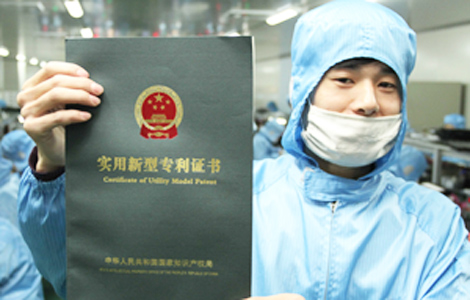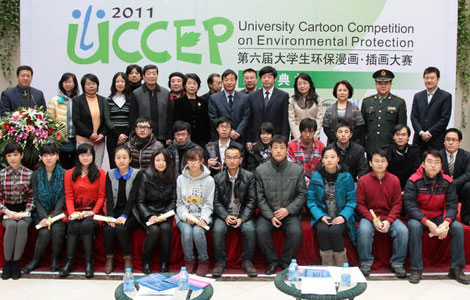More focus on intellectual property needed: Officials
Updated: 2011-12-29 07:55
By Wei Tian (China Daily)
|
|||||||||||
|
 According to a report by the National Development and Reform Commission, companies contributed more than 70 percent of the funds in China for research and development in 2010. The country has the world's largest number of researchers, with 2.55 million people working to facilitate industrial upgrading. [Photo / China Daily] |
Firms must raise investment to obtain more international patents
BEIJING - More enterprises are enjoying the benefits of China's innovation-friendly environment as the volume of funds invested in research rise.
However, the quality and global influence of the country's industrial innovations still need to be improved, officials and experts said.
"There are 20 percent more companies benefiting from the incentives they can earn by investing in innovation than in 2010. And China is seeing research investment grow by 20 percent year-on-year," said Zhang Xiaoqiang, vice-minister of the National Development and Reform Commission (NDRC), at a forum sponsored by Economic Daily in Beijing on Wednesday.
Zhang said investment in 2011 will be equivalent to 1.83 percent of China's GDP, which will equal approximately 795 billion yuan ($125.7 billion) if the world's second-largest economy grows by 9.2 percent this year.
Since 2006, many companies have boosted investment in research and development (R&D) after China vowed to build an "innovation-driven country" and issued more than 80 incentive measures for innovation.
According to an NDRC report, companies contributed more than 70 percent of the funds for R&D in 2010. And China has the world's largest number of research personnel, with 2.55 million people working to facilitate industrial upgrading.
China also became the world's top filer of patents in 2011, overtaking both the United States and Japan, according to Thomson Reuters.
Published applications from China's patents office have risen by an average of 16.7 percent annually, from 171,000 in 2006 to nearly 314,000 in 2010. That has seen Chinese companies outpace foreign businesses in the patents boom, the report showed.
However, Zheng Xinli, vice-president of the government think tank China Center for International Economic Exchanges, said there is still room for improvement and the country should play a bigger role in the patents market globally.
Even with the 20 percent rise in numbers and attractive incentives, fewer than 50 percent of all Chinese businesses engage in R&D work on their products, Zheng said.
Liu Shijin, deputy director of the Development Research Center of the State Council, said that many businesses have moved away from the manufacturing sphere and are addicted to investing in the financial and property markets, where there is a higher rate of return. Both markets should be subject to greater regulation, he said.
"Also, the government should not interfere too much with the innovation process," Liu said.
In the meantime, compared with a boom in the overall number of patent applications, overseas applications are more difficult to obtain and therefore, should be given a higher priority, said Zheng.
"The number of international patents filed by the US is still 3.6 times higher than in China," Zheng said, adding that the gap will not be closed before 2015.
Patents filed by companies in Japan and the US accounted for 34 percent of the Chinese market in 2010, but China's share in overseas markets is almost negligible, he said.
Private businesses currently contribute 68 percent of Chinese applications for overseas patents, and Zheng urged State-owned enterprises to become a major force in future growth.
"The authorities should consider granting certain allowances to companies applying for overseas patents, as in Shenzhen," Zheng said.
Shenzhen, where more than 60 percent of local output is generated by high-tech industries, was awarded the "most innovative city" by the Economic Daily.
Two of the city's leading companies, Huawei Technologies Co Ltd and ZTE Corp, jointly contributed 28 percent of China's overseas patents applications last year.
- Mengniu shares plunge on milk scare
- Alibaba opens doors to its group-buying platform
- Huawei begins CEO rotation to pave management succession
- Nine employers arrested for withholding wages
- COFCO plans to expand global logistics system
- Agriculture still vital to China
- Agriculture a fertile field for investment
- Banks 'must prepare' for eurozone changes










